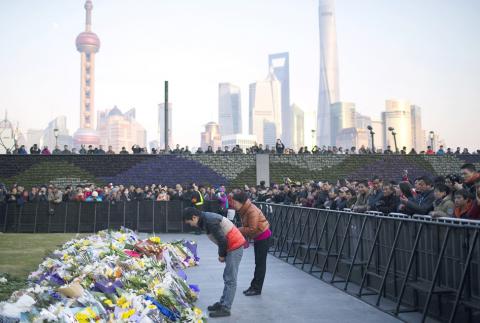China yesterday demanded a review of crowd-safety procedures as dozens of people remain in Shanghai’s hospitals after a deadly stampede on New Year’s Eve killed 36 and caused the cancelation of celebrations across the city.
At least 49 people were injured, including 31 still serious enough to require hospitalization, the Shanghai government said on its Web site. The stampede — the city’s deadliest disaster since 2010 — started at about 11:35pm, as tens of thousands of people crowded into the historic Bund riverside district for a light show.
Chinese President Xi Jinping (習近平) ordered an investigation and told local governments to prioritize safety ahead of the mass celebrations for the Lunar New Year holidays next month.

Photo: Reuters
The China National Tourism Administration issued an emergency notice on Thursday night requiring its local offices to establish procedures to control crowd flows at tourist spots.
While Shanghai authorities said they were still investigating the cause of the accident, eyewitnesses and family members of those injured described scenes where people were impeding the flow of traffic trying to escape the crowds, while others fell on top of each other at a pedestrian platform along the river.
Pictures posted on social media showed people that night packed tightly together in the Bund’s Chen Yi Square, where the incident occurred.
“This is a completely avoidable incident, as using today’s Internet and Big Data technologies’ early-warning mechanisms are completely feasible,” said Yi Peng, an urbanization researcher at Pangoal, a Beijing-based public policy research institute. “Doesn’t everyone in the area have a cellphone? Warnings could have been sent through Weibo, WeChat and all kinds of ways to avoid such a tragedy.”
The government blocked off an area at the Bund for people to lay flowers to mourn those who died in the tragedy.
It also made available a team of experts to provide psychological help to victims and families, according to its Web site and microblog.
The reason for the accident was still under investigation, according to staff at the Shanghai government media office who asked not to be named.
Four of the dead have yet to be identified, the person said.
Two-thirds of the fatalities were female, according to a name list posted by the government yesterday. Ages of the deceased ranged from 12 to 37, the list showed.
Shanghai party secretary Han Zheng (韓正) on Thursday said that the municipality would review the planning of large events, especially those in densely crowded places.

CHAOS: Iranians took to the streets playing celebratory music after reports of Khamenei’s death on Saturday, while mourners also gathered in Tehran yesterday Iranian Supreme Leader Ayatollah Ali Khamenei was killed in a major attack on Iran launched by Israel and the US, throwing the future of the Islamic republic into doubt and raising the risk of regional instability. Iranian state television and the state-run IRNA news agency announced the 86-year-old’s death early yesterday. US President Donald Trump said it gave Iranians their “greatest chance” to “take back” their country. The announcements came after a joint US and Israeli aerial bombardment that targeted Iranian military and governmental sites. Trump said the “heavy and pinpoint bombing” would continue through the week or as long

TRUST: The KMT said it respected the US’ timing and considerations, and hoped it would continue to honor its commitments to helping Taiwan bolster its defenses and deterrence US President Donald Trump is delaying a multibillion-dollar arms sale to Taiwan to ensure his visit to Beijing is successful, a New York Times report said. The weapons sales package has stalled in the US Department of State, the report said, citing US officials it did not identify. The White House has told agencies not to push forward ahead of Trump’s meeting with Chinese President Xi Jinping (習近平), it said. The two last month held a phone call to discuss trade and geopolitical flashpoints ahead of the summit. Xi raised the Taiwan issue and urged the US to handle arms sales to

State-run CPC Corp, Taiwan (CPC, 台灣中油) yesterday said that it had confirmed on Saturday night with its liquefied natural gas (LNG) and crude oil suppliers that shipments are proceeding as scheduled and that domestic supplies remain unaffected. The CPC yesterday announced the gasoline and diesel prices will rise by NT$0.2 and NT$0.4 per liter, respectively, starting Monday, citing Middle East tensions and blizzards in the eastern United States. CPC also iterated it has been reducing the proportion of crude oil imports from the Middle East and diversifying its supply sources in the past few years in response to geopolitical risks, expanding

Pro-democracy media tycoon Jimmy Lai’s (黎智英) fraud conviction and prison sentence were yesterday overturned by a Hong Kong court, in a surprise legal decision that comes soon after Lai was jailed for 20 years on a separate national security charge. Judges Jeremy Poon (潘兆初), Anthea Pang (彭寶琴) and Derek Pang (彭偉昌) said in the judgement that they allowed the appeal from Lai, and another defendant in the case, to proceed, as a lower court judge had “erred.” “The Court of Appeal gave them leave to appeal against their conviction, allowed their appeals, quashed the convictions and set aside the sentences,” the judges